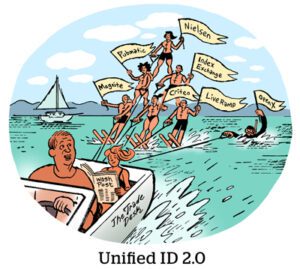 Richard Lawrence has been named Leader, Business Science & Marketing Analytics at Mindshare North America, a media agency within WPP’s Group M.
Richard Lawrence has been named Leader, Business Science & Marketing Analytics at Mindshare North America, a media agency within WPP’s Group M.
In reference to the hiring of Lawrence, Mindshare North America CEO Phil Cowdell said in a release, “His broad expertise in research, interpreting data, and client consulting will help us better identify and understand our clients’ business needs and strategies and improve the way we frame our media and marketing communications solutions around these needs.” Read more.
Lawrence briefly discussed his experience and some of his views with AdExchanger.com.
AdExchanger.com: You’ve come from IBM to join Mindshare… What do IBM and Mindshare have in common in terms of fitting into the world of the marketer in the future?
RL: I think the world of the marketer has encountered a “big bang” effect and it has gained velocity with digital. So with that “big bang,” if you will, there has been an explosion of data that is metaphorically available. An organization like IBM, is well placed, as are others, to organize data into meaningful “chunks” and provide insight.
But, whether you’re looking at IBM or Mindshare, it’s a continuum of services with core technology – and strategy at one end.
My attraction to Mindshare is the fact that it’s more at the point of the spear, if you will, by getting closer to the interaction between the communication’s message and the consumer’s buying habits. To me, that represents a great deal of excitement.
The evolution that we’ve seen in the past few years within the digital space, and the necessary changes that the traditional media has made is critical.
Thinking about the agency of the future, what do you think some of the ground troops might look like?
“Teaming” is going to be extremely important at an organizational level, with traditional silos being less of a stronghold. The agency of the future is going to have to be better at integrating across disciplines. But, individuals are going to need to be specialists, too.
You’ll have your SMEs – subject matter experts – that will live and die by certain disciplines and be immersed in it as they are today. But I think you’re going to see a larger group of more seasoned people that, out of necessity, have cross‑disciplinary experience.
Finally, I think there’s going to be a higher level of personal accountability for cross‑discipline integration and learning over the course of a career.
What are some first steps for marketers that you’d recommend in order to help them get their arms around “big data?”
The reality in a lot of client organizations is “big data” represents legacy systems and thinking.
Still, it will be a necessity to move from silo thinking to consideration of the lifecycle of the consumer and brand, and then collect data across both of those lifecycles.
The best marketers are the ones that have a strong vision and articulate who their consumers are. They’re addressing the “big data” issue, for example, by doing more and more pilot [studies] regarding understanding pieces of the puzzle, if you will.
On the other hand, the biggest challenges behind “big data” are the integration questions and the ability for companies to find the value of it. Bringing analytics to bear and finding those gems of outgoing interaction will define successful communications.
Given the challenge around pulling out these gems – finding these actionable insights on behalf of the marketer – do you see the agency owning technology down the road? Or, is it more about licensing it?
I think it’s a mix. There are some things that will be proprietary and there are [licensed] core technologies in data collection, manipulation and analysis, that are quite well-known and will provide some fundamental capabilities. But then, over and above that, your ability to create unique technologies and deploy them on a client‑by‑client basis in order to serve that client need, I think, is going to be more and more important.
Some agencies with technological capabilities themselves will endeavor to build their own proprietary components that aren’t necessarily represented in more mass market tool sets. As I said – a mix.
Any top line thoughts on how you see the tracking of brand metrics evolving in digital such that it satisfies the brand marketer?
The top line thought for me is more one of overall accountability. There has to be integration with other data sources, and there has to be innovation.
I think the accountability is derived from a deep-dive in order to achieve that “a‑ha” moment, if you will. The integration is a necessity for digital in order to share a place at the table with traditional media. The consumer defines the channels, and the consumer defines how they’re receiving the message and the ability for digital to realize that they’re part of a bigger universe. And therefore, the integration of all those messages and all those channels is critical.
And then, I think you have to look at innovation and its ability to uniquely solve problems through metrics within the digital realm itself. I think, for instance, a consumer is not just demographics. They’re behaviors, they’re demographics – they’re a combination of a lot of things.
The ability for digital to add its component and provide a view of me as a consumer when I’m online, versus me as a consumer when I’m watching television, versus me as a consumer when I’m looking at out of home or at a placard on a subway, etc…. the question has to be addressed from all angles.
By John Ebbert












